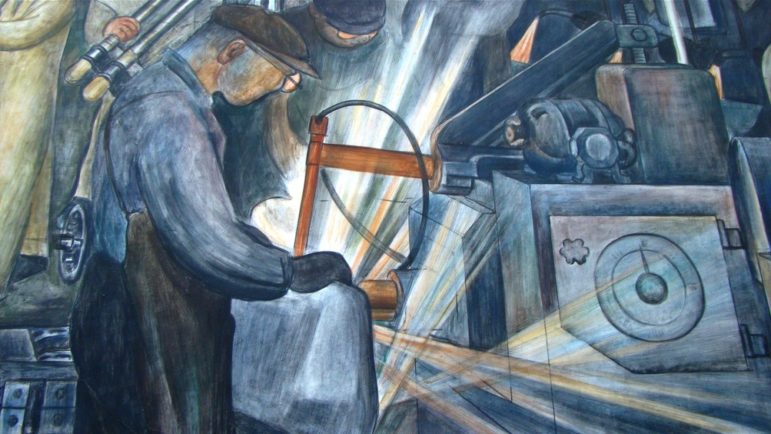
May 6, 2016; Bloomberg BNA and Forbes, “Opinion”
Does the “Grand Bargain” that rescued Detroit from bankruptcy provide a way forward for other cities struggling with similar and huge economic problems? Howard Husock, vice president for research and publications at the Manhattan Institute, suggests that it could for cities “straining under the burden of ‘legacy costs’ and a paralyzed politics that’s been unable to deal with them, even as city services erode.”
Due to an underfunded municipal pension system, a stagnant local economy, a shrinking tax base, and an inability to adequately provide city services, Detroit became the first major American city in modern times to declare bankruptcy. The Detroit agreement allowed Detroit to eliminate $7 billion of accumulated debt, reinvest more than $1 billion dollars into neglected public services, reduce its pension obligations to retirees, and cut payments to bondholders.
What made the Detroit solution unique—though, as Husock believes, perhaps replicable—was the key role the philanthropic community played. Initially motivated by the looming loss of $1 billion of city owned artwork, twelve major Detroit-based foundations stepped forward and committed $268.7 million (net-present-value dollars, 2015), motivating the state government to contribute $194.8 million and retirees and unions to agree to $1.33 billion in reduced pensions. In an interview with NPR News in November 2014, Darren Walker, president of the Ford Foundation, described the motivation for the foundation’s intervention:
We’re not in the business of solving bankruptcies, but we do solve big problems and work with leaders at the city level and the community level, public and private sectors, to help solve community problems. […] This was a complicated $20 billion bankruptcy with thousands of creditors and many contested issues. But our focus, which was on saving the Detroit Institute of the Arts and ameliorating the situation for the workers of the city, particularly those retirees under the pension fund…that was what we were able to help accomplish.
Key to the deal was the privatization of the world-renowned Detroit Institute of Arts, which the city essentially sold to a private nonprofit established to run it. The funding for purchasing the institute came from large foundations such as Kresge and Ford, and the proceeds contributed to the pension bailout. The Manhattan Institute said that there are sufficient philanthropic assets in Chicago, St. Louis, Cleveland, and Buffalo to achieve the same result.
Sign up for our free newsletters
Subscribe to NPQ's newsletters to have our top stories delivered directly to your inbox.
By signing up, you agree to our privacy policy and terms of use, and to receive messages from NPQ and our partners.
From Husock’s perspective, other cities should study Detroit’s model carefully because their foundations have the necessary resources to make a significant contribution to a “bargain.” However, Bloomberg News reports that academics and attorneys specializing in municipal finance doubt that the public pension overhaul proposal by the Manhattan Institute based on that model could remedy the significant retirement liabilities. The experts also disagreed with the Manhattan Institute’s claim that regional and national foundations would be willing to be a “piggy bank” for cities’ public-sector pension debts.
Christopher R. Berry, director of the Center for Municipal Finance at the University of Chicago’s Harris School of Public Policy, told Bloomberg that the Manhattan Institute’s analysis reflects a misunderstanding of Detroit’s experience. He said the pension portion of that grand bargain included new funds from outside sources, cuts in pension benefits, and a “long-term bet” on the city’s capacity to recover, reducing its pension contributions for 10 years while it focused on economic recovery. He calls the model “uncertain.”
“The Grand Bargain was a way out of bankruptcy. It wasn’t a grand solution to the pension problem,” he told Bloomberg.
Some experts are saying that the initial analyses of the state of Detroit’s pension systems since the approval of the bankruptcy plan in 2014 aren’t encouraging: “The problem is the hole is getting bigger,” said one.
The John D. and Catherine T. MacArthur Foundation also dismissed the Manhattan Institute’s call for philanthropic organizations to play a role in resolving Chicago’s $20 billion pension crisis, saying, “A long-term solution to the fiscal challenges in Chicago will require significant political compromise and legislative action that demonstrably are not possible in the context of the current intransigent stalemate in our state capital.”—Martin Levine and Larry Kaplan













